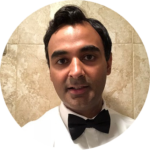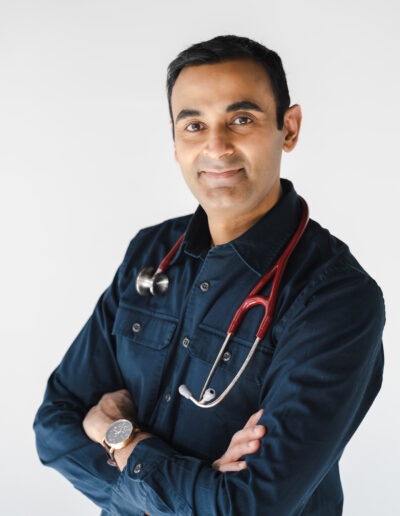Physicians as a whole are not known for being the most down-to-earth or humble individuals. Ask most people out there who some of the most big-headed or know-it-all professionals are, and doctors may well be near the top of the list. I actually think that a lot of this perception is unfair, because huge generational shifts are taking place that have produced different attitudes amongst physicians (and the fact that there have been dramatic percentage increases in females entering medicine, is also probably a good thing as far as this goes). I know that I’ve changed a lot myself since I first graduated, and have become so much more open to any suggestions that come my way, rather than becoming defensive or a little belligerent, at the thought of a challenge or a different professional angle. It’s also been my experience that the best pieces of advice don’t come from the people immediately around you, but other random people. The elderly family member who tells me that I look like I’m in a hurry or talking too fast, and need to sit down at the bedside. The housekeeper who tells me that she always sees me seeing patients on a particular floor later in the day, and asks why I don’t round on that floor a little earlier. The random hospital worker who passes me in the corridor and tells me I look like I need a break. And of course, our patients themselves, who a lot of the time, already know their diagnosis before they even see us (a subject I’ve written about previously in this article).
The amount of times a patient has suggested the correct diagnosis or test to do, that I wasn’t immediately thinking of, are too numerous to count (and every doctor will secretly admit to if they are honest). Listening to certain bits of advice and then using them to hopefully raise my own game and become a better physician (and person), is something that I now consider vital to my own personal growth. Life is full of interactions where observations or different viewpoints will be thrown your way. Some are not too nice or helpful, but the vast majority tend to come from well-meaning people who are just telling the truth. It’s critical that ego never gets in the way of listening to something you may not have been thinking—because the very best and high-achieving people out there, always listen very carefully when they hear something that sounds like it may be worth reflecting on, even when it comes from the most unlikely source.
I will tell you a true story that perfectly illustrates this. To all Americans reading, there’s a sport that’s very popular in the United Kingdom and all of the British Commonwealth countries, including the entire Asian subcontinent and Australia. It’s called cricket, and technically it is the most popular sport in the world by sheer billions of people following it! From 1990 to 2013 a player from India graced the sport, who is widely thought of as the greatest batsman of all time. His name is Sachin Tendulkar. To give you an idea of what a big name he was (and still is) in the entire cricket-playing world, think Tom Brady or Michael Jordan, and multiply that several fold. He broke all sorts of records and was a personal hero to me as a keen cricketer while I was growing up. At some point in his glittering career, he had lost some form, and was staying in a hotel in the Indian city of Madras. He was being served coffee in his room by a hotel worker.
Anyone who has ever been to a Third World country, will observe that the relationship of any type of server to the ones they serve, is pretty 19th century compared to the west (many Indians still call the people serving them their “servants”). This server was a big cricket fan and as he poured Sachin Tendulkar coffee, sheepishly asked him if he minded telling him something. The cricket star said that he could, and the server then went on to tell him that as an avid fan, he had watched lots of videos of him playing. He thought that whenever he wore a certain protective arm guard, it was getting in the way of him playing shots correctly, and he should think about changing it. On the surface of it, this seemed like a ridiculous suggestion. Tendulkar was an international megastar, surrounded by highly paid coaches and consultants. He also had billions of fans. Nobody had ever told him this. Nevertheless, he went home and started watching videos of himself—and indeed came to the conclusion that there could have been a problem with his arm guard. He ordered that it be designed differently and cut to a different shape. You can guess what happened next. Tendulkar’s shot-playing dramatically picked up, and he regained his form!
Great learning point here folks. If one of the biggest sports stars in the world can listen to what turned out to be amazing advice from his lowly servant, then none of us should ever be too big for our boots to listen to others’ suggestions.

Suneel Dhand is a physician, writer and speaker. He is Co-Founder at DocsDox.
Follow me on:
YouTube: Suneel Dhand
Instagram: suneeldhand
Twitter: @SuneelDhand
Facebook: Dr Suneel Dhand


Excellent message! I hope many medical professionals take heed. As an advocate (and patient) for people with myalgic encephalomyelitis, I can attest to the reactions given by far too many medical professionals when being presented with important information they aren’t familiar with. ME affects about 1 million people in the US, but very few doctors are experienced with this patient population.
A prime example is that for decades (I’ve been sick 30 years), I and other patients knew that exercise exacerbated our illness. The battles with medical professionals who insisted that we were malingering and just needed to “get going” caused extreme distress and the suicides that followed could have been avoided.
We now have the science that shows that exertion exacerbates the immune dysfunction, the neurological abnormalities and the cardiac issues. Exercise in those with ME does the exact opposite of what doctors expect.
While listening to the patient can be challenging, we are experts in our disease and there is a great deal of science to back up what we know. There are many advocacy organizations doctors can look to for guidance. Sadly, the major health policy agencies and medical information sites (like Up-to-Date) are not actually up to date with the latest information.
The message that doctors are becoming more willing to listen gives me hope as we begin a new decade.
great story and article
Thanks for reading Jo! Suneel
Dear Suneel ,
Excellent advice at the beginning of the year.
Cheers ,
Cornel.
Thank you Cornel, and a very Happy New Year to you. Suneel
Brilliant story, with a message for all of us. For those of us with invisible illness, it’s cheering that with generational change, and the wealth of information that the internet offers, that attitudes are changing, and many doctors are happy for patients who have an idea of what their diagnosis might be, and see it as a benefit. And as patients we have to always remain respectful for doctors’ knowledge and many years of training. We work together as a team, but its always the patients life that’s on the line.
Thanks Neen! Suneel